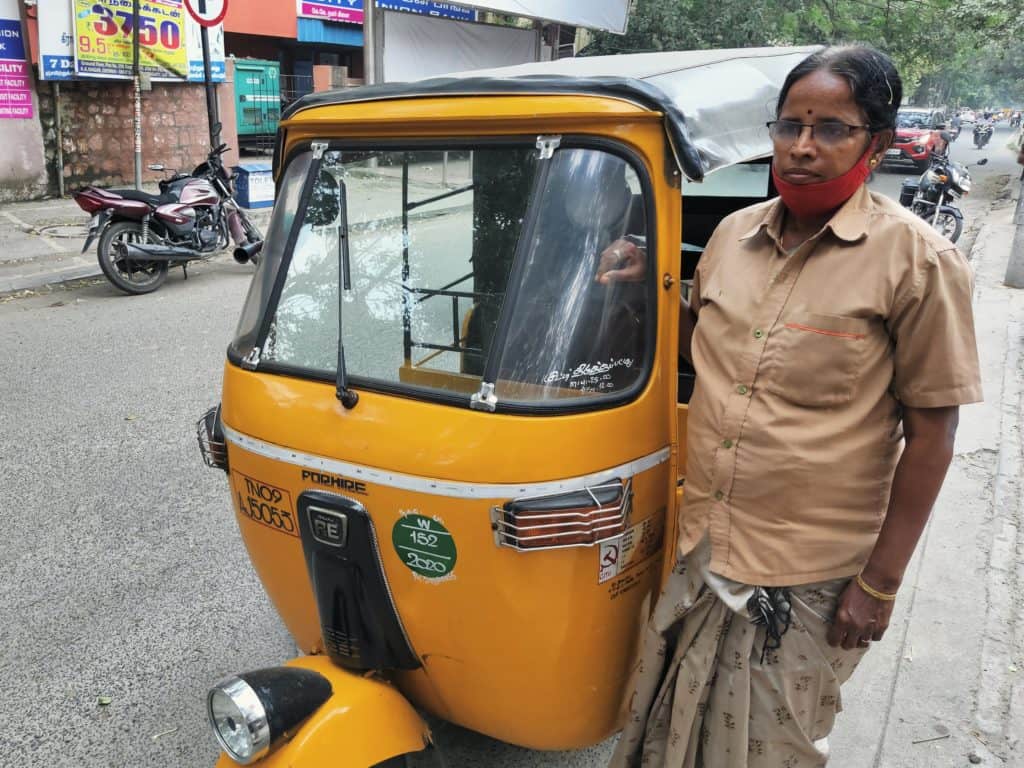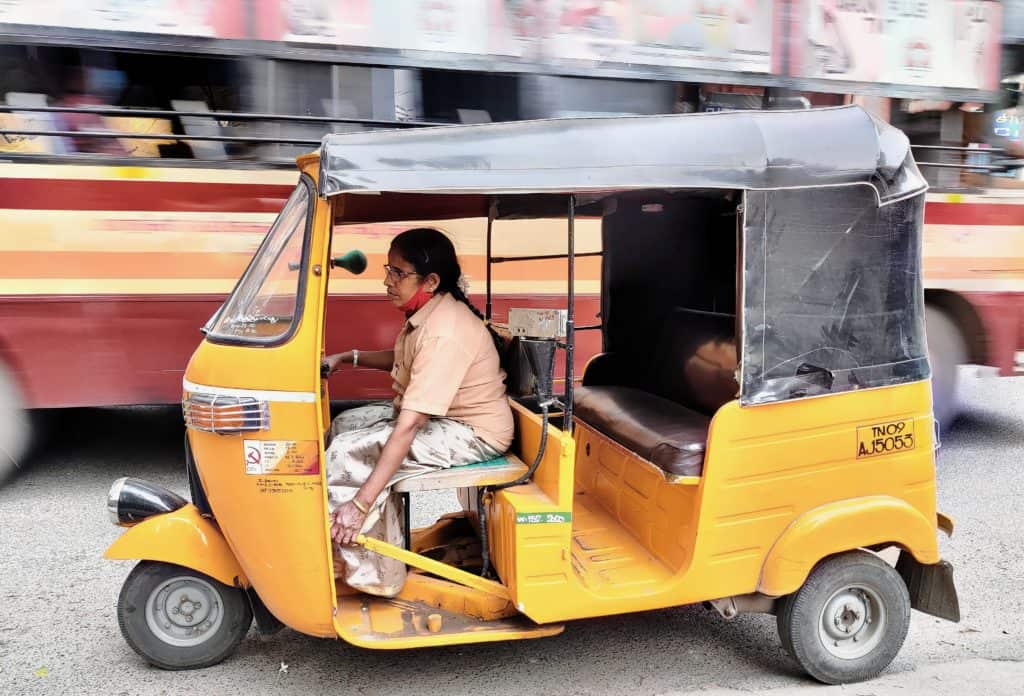Wearing a loose khaki shirt over a polyester saree, Shanthi D starts her auto on what promises to be yet another challenging day. She has been an auto driver for almost 16 years now. Shanthi started her career at a time when very few women had the courage to choose this path. Years have gone by, and while the number of women colleagues in the profession has increased, even now, she is greeted with amusement or shock by many.
Strong and determined
Women auto drivers in Chennai are a growing tribe. While their choices do reflect a degree of empowerment, most of them still get into the profession because they have no alternative. Shanthi, for example, became an auto driver to help sustain her family in the face of increasing costs of living in the city.
“I really wanted to be a police officer but fate led me to this. Fortunately, I had many well-wishers who encouraged me to take up this venture. Getting an auto on rent was not an easy job as nobody seemed willing to trust a woman with their vehicle, so I took a loan to buy a vehicle. Since then, there has been no turning back,” says Shanthi.
Shanthi feels her career has thrived mostly due to women customers. In the early days of her career, she found many female commuters who preferred a polite, no-nonsense woman driver, who would also lend a friendly ear to their problems. “Though I regret not being able to don the khakee worn by the police, it brings immense pride to wear this one,” she proudly exclaims.
Labour unions such as CITU help women with necessary support, helping out with union registration, ways and means to access government benefits, and even initial training in how to deal with customers at ease. Such support enables them to take on the challenges and balance responsibilities at work and at home.
Velakannan an auto driver and member of the CITU labour union says, “The number of women entering this profession is slowly rising. They take this up mostly because they have to sustain their families. Whatever the reason, we wholeheartedly welcome more women among us.”
Challenges galore
But imagine a workspace with no restrooms and no guarantee of safety. Would you be willing to work under such conditions? Yet, that is an everyday reality for Shanthi and others who have chosen the same path. The absence of usable public toilets act as a major pain point for women in such male-dominated professions.
“Public toilets in the city are either locked or in deplorable conditions. I mostly rely on customers to let me use their toilets or ride back home to relieve myself,” says Shanthi.
Most of the women in the field come across as being brave and strong. “It is important to stay strong and keep our chin up. I have learnt self-defence and I usually don’t take rides after midnight,” says Shanthi.
Slow acceptance
Women auto drivers are perceived to be more polite and responsible than their male counterparts. As a result, they have managed to gain the trust of customers. But it has been a long road, they say.
Jayashree has been in the profession for more than 15 years now. Recalling the initial days of her career, she says, “Many commuters didn’t want a woman driver, they doubted my abilities. Many still believe women cannot make good drivers. Everyday, through my work, I try to break such prejudice.”
Setting aside sporadic incidents, however, women auto drivers generally command respect from Chennaiites these days. “They could have been in other low-paying jobs such as housekeeping. Only because they believed in themselves and their abilities could they step out of the beaten track,” says Sriram Abhi, an IT professional, who had a woman driver taking him to office regularly before the lockdown.

Needed: More security and better conditions
With the government’s announcement of a lockdown due to COVID on March 20, 2020, which eventually ran into months, the lives of auto drivers became fraught with uncertainty, as public transport went off the roads. Even after the lockdown was lifted, many people continued to work from home or used private vehicles.
Even long time auto drivers were badly hit. Lakshmi, who has been running an auto for more than 25 years, had to sell her vehicle during the lockdown. “What else can I do if there is no money?” she asks.
The Autorickshaw and Taxi Drivers’ Welfare Board under the Tamil Nadu Government assisted them with a meagre dole out of Rs 1000 and rations worth 15 kg of rice, one kg of dal and one kg of edible oil, but that was hardly sufficient to see the families through the lockdown period.
Read more: Why are auto drivers in Chennai struggling to survive despite CM’s promise of help?
Customers turned Good Samaritans for some drivers. Women auto drivers with a good reputation, such as Shanthi, have many well-wishers; even during the lockdown, several loyal customers paid Shanthi the monthly fee for the scheduled rides they usually take in her auto.
Despite her own struggle, Shanthi distributed groceries and helped other women auto drivers access aid from the government. “Drivers who are not a part of any union or associations are unaware of the existence of the Auto Rickshaw and Taxi Drivers’ Welfare Board. Only those who are members of the board were eligible for the aid announced by the Chief Minister last year. I have done my part in spreading awareness on this,” Shanthi says.
According to last year’s data from CITU, only 24,600 of the total 1 lakh authorised auto drivers in Chennai belong to the driver welfare board. There are over 100 women auto drivers in Chennai who have entered the profession since 2000. Till date there are no schemes specially for women in the field.
Amenities such as proper public toilets and utilities, and also stricter safety regulations in place will support and encourage more women drivers. Likewise, implementation of targeted beneficiary schemes for women in the field will also lead more of them to take up the profession.
Also Read:

Excellent effort, bringing the issues to the forefront
Good going
Keep it up